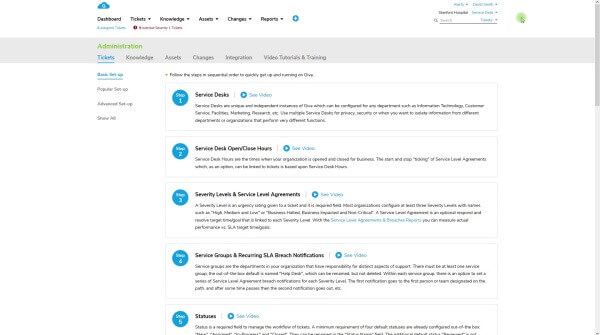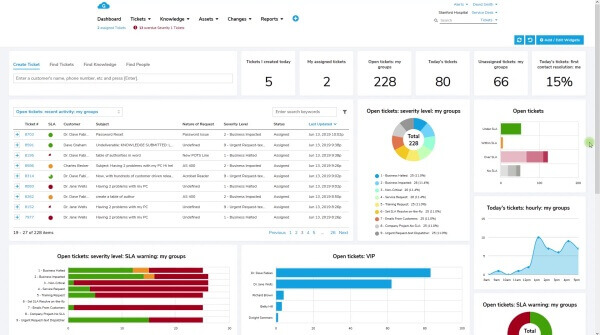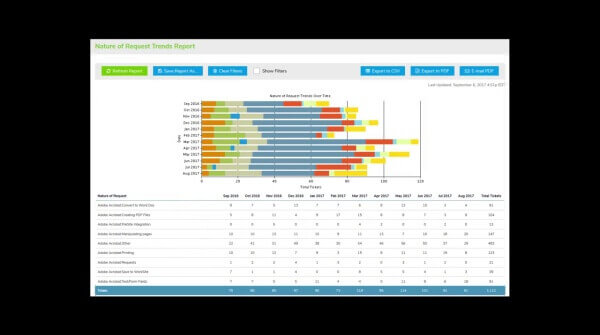Why is Giva the Best HIPAA-Compliant Ticketing System?
Giva is used by healthcare IT companies, banks, law firms and other organizations all over the world that demand high security and compliance.
What's in this article?
- Giva feature: Easy-to-use & intuitive set-up
- Giva feature: Custom dashboards
- Giva feature: Reporting analytics
- Giva features: How is Giva different?
- Giva feature: Multiple service desks
- Highest security due to HIPAA compliance as a standard feature for all customers. Helps prevent cyberattacks, data breaches, malware, etc.
- Reduces start-up/initial time to deploy; easy-to-follow administration, video library and Giva technical product experts.
- No coding, programming or consultants required for set-up of Active Directory integration.
- ITIL compliant but different modules can be used as needed. Out-of-box industry "best practices" and default options.
- Worldwide implementation in just days.
- Intuitive design results in lowest training costs.
- Lowest Total Cost of Ownership (TCO) and highest ROI with a quick payback.
- Fewer resources required for ongoing Giva maintenance.
- Outstanding and award-winning Technical Support organization.
- 100% cloud based; only a standard web browser is required. No software locally installed.
Giva feature: Easy-to-use & intuitive set-up
It's very easy to get started with Giva's HIPAA-compliant ticketing system. The administration is well organized and logical, so just follow the step-by-step process, and you'll be ready to use Giva after just 10 easy steps in the basic set-up. You can also quickly change default settings that come with the trial account. Continue with popular and advanced set-up options for more features and customization. All the modules are well integrated and part of our ITIL-compliant ticketing system.
There's a video library that will enable you to learn Giva's service desk ticketing system in less than 1 hour and deploy Giva in just a few days. The Quick Start Guide is also a helpful resource.
Your trial account is already configured with common default settings, so you can get stared right away with our ticket management system.
Giva feature: Custom dashboards
Giva provides actionable custom dashboards to help reduce call volume and increase customer satisfaction with data-driven decision making. Giva's support ticketing system helps teams focus on the right priorities and nothing is ever overlooked with the red/orange/green warnings. We have dozens of customizable prebuilt dashboard widgets to arrange any way you like. Everyone can create a custom dashboard on the homepage, and they can size each widget as desired.
Giva feature: Reporting analytics
Generate reports fast & reduce high call volume
Giva's robust, fast and painless custom reporting helps make higher-quality, data-driven decisions. Giva reporting analytics feature full color, high contrast charts and graphs that allow for more graphically-driven data presentation to better understand relationships between all the data. Giva reports enable you to reduce call volume and increase customer satisfaction.
- Allows for quickly generating monthly reports, scorecards and KPIs full of actionable information.
- Increases visibility and accountability with real-time trend reporting analytics, charts, and metrics.
- Increases productivity with real-time custom dashboards and reports. Easy Three Click Reporting Analytics™ works right out-of-the box for business analytics, monthly and ad hoc reports.
Pull reports easily
Generating reports is easy and does not require a company "report genius" or business intelligence data analysts. Metrics, business analytics and key performance indicators allow leaders to reduce high call volumes by identifying emerging problems, issues, trends and patterns so that systemic changes can be made. These reporting alaytics can be printed with high quality right from any browser, or downloaded to a CSV or color PDF file.
- Decreases call time required to create and assign support tickets with intuitive design.
- Increases information captured during initial phone call or contact.
- Increases number of support tickets created using intuitive design.
- Easiest to navigate and search.
- Increases first call resolution using troubleshooting tools.
- Speeds issue resolution and increases customer satisfaction with integrated knowledge base and FAQ.
- Increases productivity with integrated custom forms to capture optional or required information.
- Decreases average time to close support tickets.
- Increases productivity for geographically-dispersed workforces.
- Decreases number of support tickets that remain open from day-to-day.
- Reduces paper-based business processes with automated workflows.
- Increases team productivity and decreases call volume with accessible end user/customer self-service portal.
- Increases responsiveness and customer satisfaction of end users.
- Increases meeting service level agreement goals.
Giva features: How is Giva different?
Macros help rapidly create and edit service tickets

Use for recurring issues such as password resets, order status and "how to" questions.
A macro can be used as a starting place for a new service ticket, and then as agents interact with customers, more information can be added on-the-fly. To use the password reset macro, simply click "Apply Macro". This could be for a new ticket or one already opened.
Use a macro to close a service ticket while updating several other fields. After a ticket is created, Macros can be used for standardized canned responses to automate commonly repeated ticket tasks, such as responding to a customer with a Note, assigning a ticket to a group or person, changing a severity level or status, closing a ticket, etc. Macros are used to apply changes to a service ticket or populate default information in a ticket so Agents can work more rapidly.
Auto close rules
Configure business rules and workflows to automatically close tickets.
The auto-close tickets feature allows you to configure business rules and workflows so service tickets can be automatically closed after a specified time if the ticket has not been updated. For example, Agents may complete the work but are awaiting customer confirmation before closing a service ticket, which is a customer service best practice. However, if the customer does not provide a timely confirmation or reply, then there is a high probability that the problem was solved. This is a common scenario in many organizations, so service ticket auto-close rules can increase Agent productivity.
Quick resolutions
Leverage valuable solutions already created in previously resolved service tickets.
The "Find Quick Resolution" function allows you to quickly leverage the valuable solutions already created by your team in previously resolved service tickets for use in troubleshooting currently open tickets.
Scheduled tasks
Automatically open support tickets in the future on a scheduled and recurring basis. Some examples might be recurring scheduled maintenance tasks, project timeline reminders, employee onboarding/offboarding, month end tasks, etc.
Tsunami tickets
Giva has a unique feature called "Tsunami Tickets", which allows agents to link multiple support tickets related to the same event to function as one support ticket, typically occurring during an emergency or major outage where many people are impacted and contacting support. These tickets can be linked together for easy concurrent updating; any change to a ticket gets copied to all the linked tickets.
When an emergency event has been identified, first, consider adding a Marquee Message to alert the appropriate Service Groups. This is a horizontal scrolling ticker tape message along the top above the navigation, and can be seen by Agents, and Customers if they log into the Self-Service Portal. This will help reduce high call volumes.
Once a tsunami ticket exists, a warning link will show in the top navigation of any page, which when clicked will display a list of the tsunami tickets. At the bottom of custom dashboard, a warning bar will be displayed indicating an open tsunami event.
To measure the impact of tsunami events, use the "Tsunami Tickets & Major Outages Report". This provides valuable reporting analytics to help take action to correct systemic problems and minimize major outages in the future.
Parent/child tickets
Tasks can be added to tickets to make child tickets so projects can be managed and tracked.
You can add any number of sub-tasks to any service ticket which is called a Parent ticket, and the sub-tasks are called Child tickets. For example, a parent ticket could be created for onboarding a new employee or customer, and the child tickets would be the individual tasks required, such as setting up an email address, creating user accounts, etc. The parent ticket cannot be closed until all the child tickets are closed, which helps ensure all sub-tasks are completed.
Automatic escalation of tickets
Helps ensure that nothing falls through the cracks, so all service tickets are acted upon. Automated business rules trigger notifications when a ticket SLA is overdue.
Rules-based converting of emails into tickets
Routing and action rules are applied to emails to convert them into service tickets to get them to the correct person or group for quick action.
This feature includes in the service ticket any email attachments and embedded images. Agents can remain highly focused in Giva without having to go back and forth between email inboxes and the support ticketing system.
An unlimited number of action and routing rules can be configured, which allow service tickets to be properly prioritized. Giva scans the subject, body or sender of the email for specific words or phrases and then executes the rules.
Anywhere access on phone, tablet or desktop
With Giva's mobile application, you'll get an intuitive experience; and for higher security, there's no application to download.
Severity levels & Service Level Agreements
With Giva ticketing system software, a target time or goal can be linked to each severity level to measure and help achieve deadlines, deliver consistent service, and focus on the top priorities.
A Severity Level is an urgency rating given to a service ticket and is a required ticket field. Most organizations configure at least three Severity Levels such as "High, Medium and Low" or "Business Halted, Business Impacted and Non-Critical".
You can set Service Level Agreement options, which are respond and resolve target times or goals linked to a Severity Level so actual vs. target times or goals can be measured. With Giva's ticketing system software, even if the SLAs are not announced to your customers but simply used to set internal goals, they will improve customer service.
Temporary notes
These are editable fields that are never tracked in the support ticket history and can automatically be deleted.
This feature is a segregated data field for temporarily storing sensitive information such as passwords, special notes on a support ticket, etc.
This field can automatically be deleted after a certain amount of time has passed after the support ticket is closed, or it can be manually deleted.
Customer self-service portal
Provide round-the-clock access to help resources solve issues.
Round-the-clock access to help resources can assist customers in reviewing relevant knowledge articles, FAQs, etc. and possibly solve their issues. Customers can also create and edit their own support tickets and view updates and progress at any time.
Knowledge base

Leverage solutions for recurring problems and document company expertise in a single application.
The main content of the knowledge article is entered into the rich text editor. This allows for formatting, such as header text, bold text, lists, etc., and even drag and drop images. After articles are created, they can be marked "hot", which temporarily bypasses the approval process. The system also searches for similar articles already published to eliminate duplicate content.
CC customers and assignees
Send notifications to multiple people on a single ticket.
A person added as a Customer CC will receive the same email notifications as the support ticket's customer. Likewise, a person added as an Assignee CC will receive the same email notifications as the assignee. A person can also be added to receive a copy of any public note that's added to the ticket history.
Broadcast messages
Rapidly communicate critical information to agents and customers.
For agents and customers, the home page displays the broadcast message in a "pop-up" the first time, and then a link with a warning at the bottom of the page.
Track time worked
Analyze time spent by agents or use as an input for billing.
To track time worked, when creating or editing a support ticket, go to the "Time Worked" entry box. Entries can also be modified or deleted.
Complex ticket search
Many keyword and Boolean search options are available to quickly find the relevant information.
Copy/duplicate ticket
Allows rapid copying of all the ticket fields.
Giva feature: Multiple service desks
Giva Service Desks are independent instances of Giva that are customized for any department such as Information Technology, Customer Service, Facilities, Human Resources, Marketing, etc. Use multiple Service Desks for when you want to isolate information from different departments or organizations that perform very different functions. These allow for independent service portals for end users/customers, and help assure tickets are routed to the correct teams.
Each Service Desk has a unique and independent configuration. For example, a service desk has its own service groups, severity levels, statuses, categories, business rules, and other selectable items.
For people to access a service desk, they must specifically be granted a role in their profile. They can be a member of one or more service desks without extra cost and can have different roles in each service desk.
When customizing a service desk, application modules can be enabled as desired. The IT Service Desk may have ticketing, knowledge base, change management and asset management enabled. Another service desk, such as Customer Service, might only have ticketing and knowledge base enabled. A Human Resources or Facilities service desk might only have ticketing enabled.
Cross service desk reporting analytics have aggregated metrics across all service desks, so you'll be able to easily generate insights in a single report.






